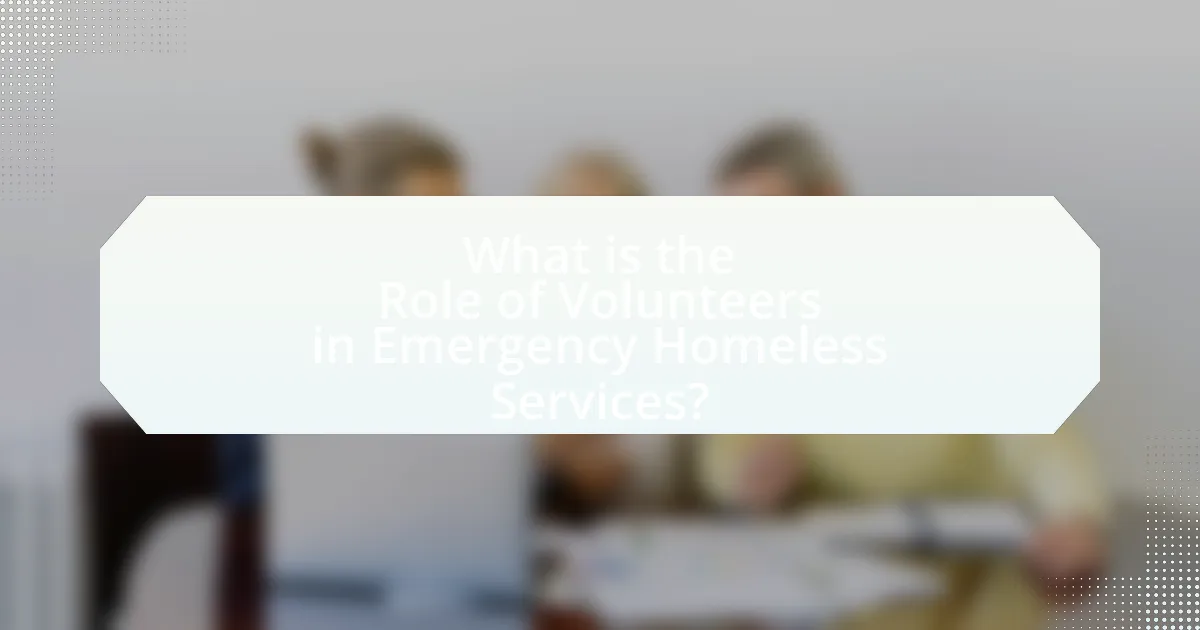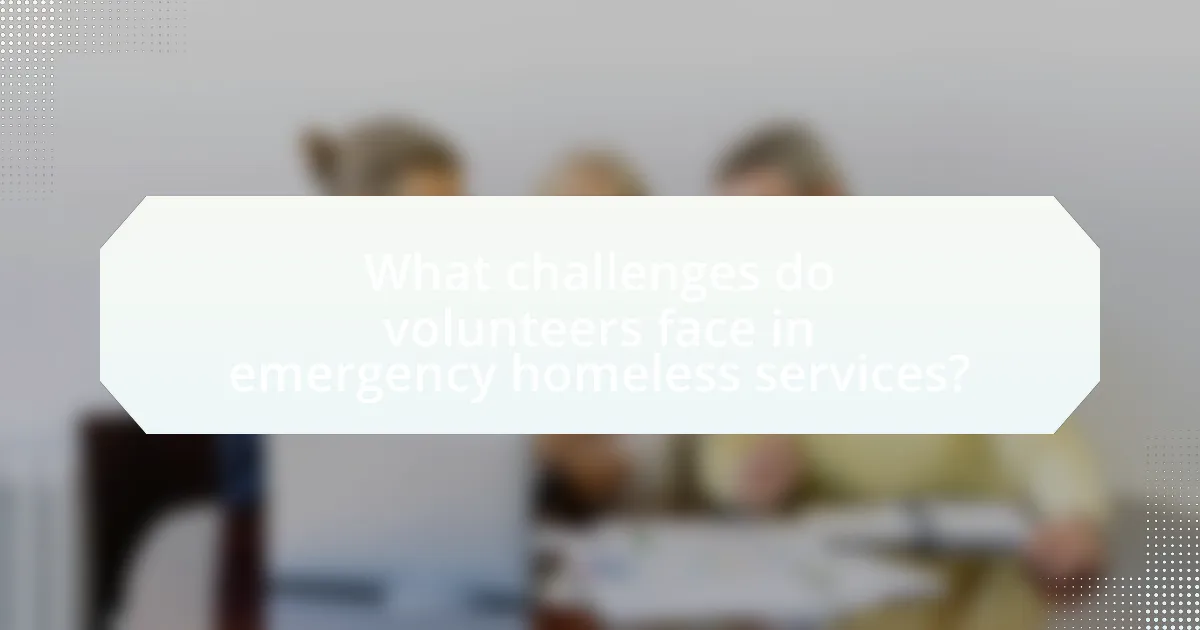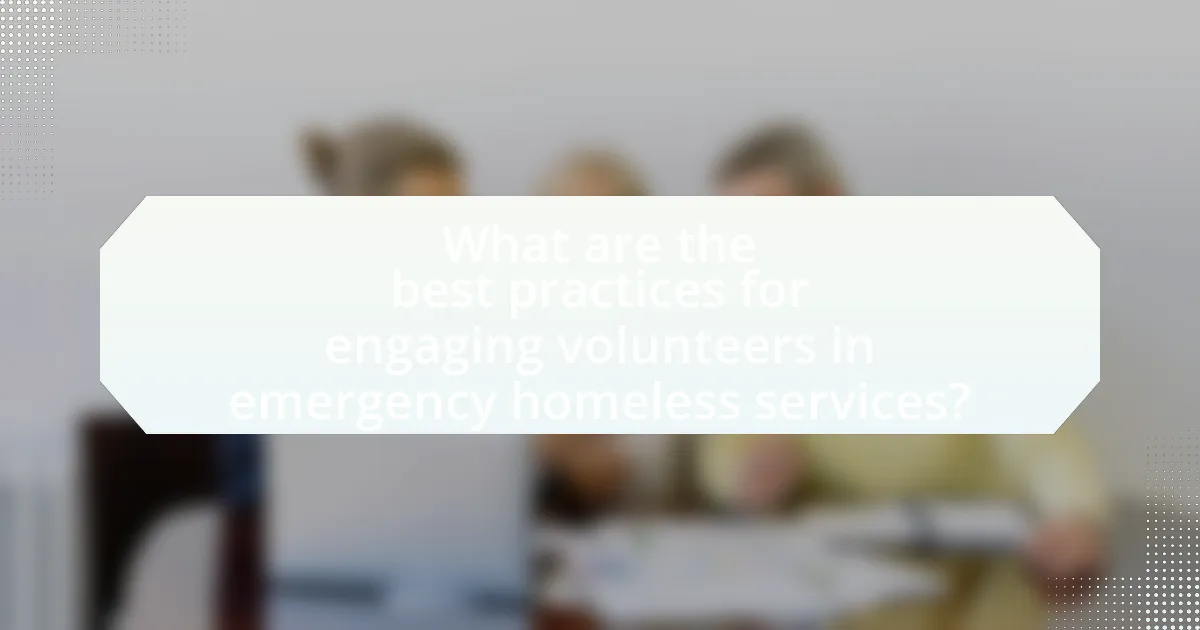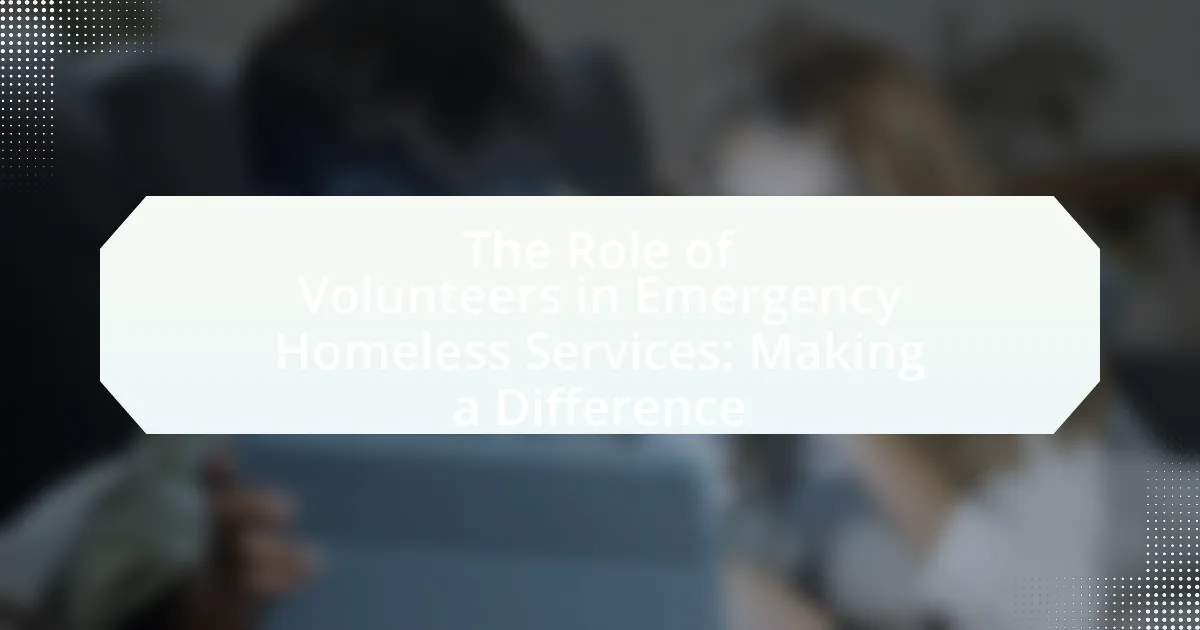The article focuses on the critical role of volunteers in emergency homeless services, highlighting their contributions to food distribution, shelter management, and emotional support for individuals experiencing homelessness. It discusses how volunteers enhance service delivery and operational efficiency, often filling gaps in staffing and resources. The article also addresses the challenges volunteers face, such as emotional strain and the need for training, while emphasizing the importance of community involvement and organizational support in fostering a positive volunteer experience. Additionally, it outlines best practices for engaging and retaining volunteers, as well as the impact of their efforts on the lives of homeless individuals.

What is the Role of Volunteers in Emergency Homeless Services?
Volunteers play a crucial role in emergency homeless services by providing essential support and resources to individuals experiencing homelessness. They assist in various capacities, including serving meals, distributing clothing, offering companionship, and helping with administrative tasks. According to the National Alliance to End Homelessness, volunteers contribute significantly to the operational efficiency of shelters and outreach programs, often filling gaps in staffing and enhancing service delivery. Their involvement not only helps meet immediate needs but also fosters community engagement and awareness about homelessness issues.
How do volunteers contribute to emergency homeless services?
Volunteers contribute to emergency homeless services by providing essential support such as food distribution, shelter management, and emotional assistance. Their involvement helps organizations operate efficiently, as volunteers often fill critical roles that would otherwise require paid staff, thereby maximizing resources. For instance, a study by the National Alliance to End Homelessness indicates that volunteer efforts can significantly enhance service delivery, with many organizations reporting that volunteers help serve thousands of meals and provide thousands of hours of shelter support annually. This direct engagement not only addresses immediate needs but also fosters community connections and awareness around homelessness issues.
What specific tasks do volunteers perform in these services?
Volunteers in emergency homeless services perform a variety of specific tasks, including providing food and shelter, offering emotional support, and assisting with resource navigation. These tasks are essential for meeting the immediate needs of homeless individuals and families. For instance, volunteers often distribute meals and hygiene kits, which directly address basic survival needs. Additionally, they may help clients access healthcare services or job training programs, facilitating pathways to stability. Research indicates that volunteer involvement significantly enhances the effectiveness of these services, as evidenced by studies showing improved outcomes for homeless individuals when supported by trained volunteers.
How do volunteers enhance the effectiveness of emergency homeless services?
Volunteers enhance the effectiveness of emergency homeless services by providing essential support that increases service capacity and improves service delivery. Their involvement allows organizations to extend outreach efforts, as volunteers often contribute time and skills that would otherwise require paid staff. For instance, a study by the National Alliance to End Homelessness found that volunteer-driven initiatives can lead to a 30% increase in the number of individuals served during emergency responses. Additionally, volunteers often bring diverse perspectives and skills, which can lead to innovative solutions tailored to the specific needs of the homeless population. This collaborative effort not only addresses immediate needs but also fosters community engagement and awareness, ultimately leading to more sustainable support systems for homeless individuals.
Why are volunteers essential in addressing homelessness?
Volunteers are essential in addressing homelessness because they provide critical support and resources that help meet the immediate needs of individuals experiencing homelessness. Their involvement enhances the capacity of organizations to deliver services such as food distribution, shelter management, and outreach programs. For instance, a study by the National Alliance to End Homelessness found that volunteer efforts significantly increase the number of people served by shelters and food banks, demonstrating that volunteers can effectively expand the reach of these services. Additionally, volunteers often bring diverse skills and perspectives, fostering community engagement and awareness, which are vital for long-term solutions to homelessness.
What impact do volunteers have on the lives of homeless individuals?
Volunteers significantly improve the lives of homeless individuals by providing essential services, emotional support, and fostering community connections. Their involvement often includes distributing food, offering medical assistance, and facilitating access to housing resources, which directly addresses immediate needs. Research indicates that programs with volunteer participation, such as those run by organizations like the National Alliance to End Homelessness, report higher success rates in helping individuals transition out of homelessness. Additionally, the presence of volunteers can enhance the mental well-being of homeless individuals by reducing feelings of isolation and increasing social interaction, which is crucial for recovery and reintegration into society.
How do volunteers help bridge gaps in service provision?
Volunteers help bridge gaps in service provision by offering essential support and resources that may be lacking in formal services. They often fill roles such as providing direct assistance to individuals experiencing homelessness, distributing food and supplies, and offering companionship and emotional support. For instance, a study by the National Alliance to End Homelessness found that volunteer-led initiatives can significantly increase the reach of services, allowing organizations to serve more individuals than they could with paid staff alone. This demonstrates that volunteers not only enhance service delivery but also foster community engagement and awareness, ultimately leading to more comprehensive support for vulnerable populations.

What challenges do volunteers face in emergency homeless services?
Volunteers in emergency homeless services face several challenges, including emotional strain, lack of training, and resource limitations. Emotional strain arises from witnessing the hardships of homeless individuals, which can lead to burnout and compassion fatigue. Additionally, many volunteers may not receive adequate training to handle complex situations, such as mental health crises or substance abuse issues, which can hinder their effectiveness. Resource limitations, such as insufficient supplies or funding, further complicate their ability to provide necessary support. These challenges highlight the need for better training programs and resource allocation to enhance volunteer effectiveness in emergency homeless services.
How can volunteers overcome obstacles in their roles?
Volunteers can overcome obstacles in their roles by actively seeking training and support from experienced team members. This approach enables them to gain the necessary skills and confidence to navigate challenges effectively. Research indicates that well-trained volunteers are more likely to remain engaged and perform better in their roles, as evidenced by a study published in the Journal of Volunteer Administration, which found that 70% of volunteers reported improved performance after receiving targeted training. Additionally, establishing open communication channels within the organization allows volunteers to voice concerns and receive guidance, further enhancing their ability to tackle obstacles.
What training or support do volunteers need to be effective?
Volunteers need comprehensive training in crisis intervention, communication skills, and understanding homelessness to be effective. This training equips them with the necessary tools to handle sensitive situations, engage with individuals experiencing homelessness, and provide appropriate support. Additionally, ongoing support through mentorship and access to resources enhances their ability to respond effectively to the needs of the community. Research indicates that well-trained volunteers significantly improve service delivery in emergency homeless services, as they are better prepared to navigate complex social dynamics and provide empathetic assistance.
How can organizations better support their volunteers?
Organizations can better support their volunteers by providing comprehensive training and resources tailored to their roles. Effective training equips volunteers with the necessary skills and knowledge to perform their tasks confidently, which is crucial in emergency homeless services where situations can be unpredictable. Research indicates that organizations that invest in volunteer training see a 50% increase in volunteer retention rates, demonstrating the importance of preparation and support. Additionally, offering regular feedback and recognition fosters a positive environment, enhancing volunteer satisfaction and commitment. By implementing these strategies, organizations can create a more effective and motivated volunteer workforce.
What are the emotional and psychological impacts on volunteers?
Volunteers in emergency homeless services experience significant emotional and psychological impacts, including increased empathy, emotional resilience, and occasional burnout. Engaging with vulnerable populations fosters a deeper understanding of social issues, enhancing volunteers’ empathy and compassion. Research indicates that volunteering can lead to improved mental health outcomes, such as reduced depression and anxiety, as volunteers often report feelings of fulfillment and purpose. However, the emotional toll of witnessing hardship can also lead to burnout, characterized by emotional exhaustion and a diminished sense of personal accomplishment. Studies show that approximately 30% of volunteers in high-stress environments experience burnout, highlighting the need for support systems to mitigate these effects.
How do volunteers cope with the emotional demands of their work?
Volunteers cope with the emotional demands of their work by employing various strategies such as seeking social support, engaging in self-care practices, and participating in training programs. Social support from fellow volunteers and community members provides emotional reinforcement, helping them process their experiences. Self-care practices, including mindfulness and stress management techniques, enable volunteers to maintain their mental well-being. Additionally, training programs equip volunteers with skills to handle challenging situations, reducing feelings of helplessness and enhancing their resilience. Research indicates that these coping mechanisms are essential for sustaining volunteer engagement and preventing burnout in high-stress environments like emergency homeless services.
What resources are available for volunteer mental health support?
Volunteer mental health support resources include organizations such as the National Alliance on Mental Illness (NAMI), which offers training and support for volunteers, and Mental Health America, providing resources for mental health advocacy and education. Additionally, local community mental health centers often have volunteer programs that focus on peer support and crisis intervention. These organizations are validated by their extensive networks and established programs that empower volunteers to assist individuals facing mental health challenges effectively.

What are the best practices for engaging volunteers in emergency homeless services?
The best practices for engaging volunteers in emergency homeless services include providing comprehensive training, establishing clear roles and responsibilities, and fostering a supportive community environment. Comprehensive training equips volunteers with the necessary skills to effectively assist homeless individuals, ensuring they understand the challenges faced by this population. Clear roles and responsibilities help volunteers know what is expected of them, which increases their confidence and effectiveness in service delivery. Additionally, fostering a supportive community environment encourages collaboration and communication among volunteers, enhancing their commitment and satisfaction. Research indicates that organizations with structured volunteer programs experience higher retention rates and improved service outcomes, demonstrating the effectiveness of these best practices.
How can organizations effectively recruit volunteers?
Organizations can effectively recruit volunteers by leveraging targeted outreach strategies, creating engaging volunteer opportunities, and fostering a strong community presence. Targeted outreach involves identifying specific demographics that align with the organization’s mission and utilizing social media, local events, and partnerships with community groups to reach potential volunteers. Engaging volunteer opportunities, such as flexible scheduling and skill-based roles, attract a diverse range of individuals. Additionally, fostering a strong community presence through awareness campaigns and testimonials from current volunteers enhances credibility and encourages participation. Research indicates that organizations with clear communication and recognition programs experience higher volunteer retention rates, further validating these recruitment strategies.
What strategies can be used to retain volunteers in the long term?
To retain volunteers in the long term, organizations should implement strategies that foster engagement, recognition, and community building. Engaging volunteers through regular training and skill development opportunities enhances their commitment and satisfaction, as evidenced by a study from the Corporation for National and Community Service, which found that volunteers who receive training are more likely to continue their service. Recognizing volunteers’ contributions through awards, public acknowledgment, and personalized thank-you notes reinforces their value and encourages ongoing participation. Additionally, creating a strong sense of community among volunteers through team-building activities and social events can strengthen their connection to the organization, leading to higher retention rates.
How can organizations create a positive volunteer experience?
Organizations can create a positive volunteer experience by providing clear communication, adequate training, and recognition for volunteers’ contributions. Clear communication ensures that volunteers understand their roles and responsibilities, which enhances their engagement and effectiveness. Adequate training equips volunteers with the necessary skills and knowledge to perform their tasks confidently, leading to a more fulfilling experience. Recognition, such as expressing gratitude or celebrating achievements, fosters a sense of belonging and appreciation, which is crucial for volunteer retention. Research indicates that organizations that implement these strategies see higher volunteer satisfaction and commitment, ultimately improving service delivery in emergency homeless services.
What role does community involvement play in supporting volunteers?
Community involvement plays a crucial role in supporting volunteers by providing them with resources, motivation, and a sense of belonging. When communities actively engage in volunteer initiatives, they create an environment that fosters collaboration and encourages individuals to contribute their time and skills. Research indicates that communities with strong volunteer networks report higher volunteer retention rates, as individuals feel more connected and valued within a supportive framework. For example, a study by the Corporation for National and Community Service found that communities with robust volunteer programs saw a 20% increase in volunteer participation, highlighting the direct correlation between community involvement and volunteer support.
How can local businesses contribute to volunteer efforts?
Local businesses can contribute to volunteer efforts by providing resources, financial support, and employee engagement opportunities. For instance, businesses can sponsor local volunteer events, donate supplies or services, and encourage employees to participate in community service through paid volunteer hours. Research indicates that companies that engage in corporate social responsibility see a 13% increase in employee satisfaction, which can enhance volunteer participation. By actively supporting volunteer initiatives, local businesses not only help address community needs but also strengthen their own workforce and brand reputation.
What partnerships can enhance volunteer engagement in emergency services?
Partnerships with local businesses, non-profit organizations, and educational institutions can significantly enhance volunteer engagement in emergency services. Local businesses can provide resources, funding, and incentives for volunteers, while non-profit organizations can offer training and support networks that foster a sense of community and purpose. Educational institutions can facilitate volunteer recruitment through service-learning programs, connecting students with emergency services and promoting civic responsibility. For instance, a study by the National Volunteer Fire Council found that community partnerships increased volunteer retention rates by 30%, demonstrating the effectiveness of collaborative efforts in engaging volunteers.
What practical tips can volunteers follow to make a difference?
Volunteers can make a difference by actively engaging in local homeless services, providing essential support such as food distribution, shelter assistance, and outreach programs. By dedicating time to these activities, volunteers directly address immediate needs and foster community connections. Research indicates that volunteer involvement in homeless services can lead to improved outcomes for individuals experiencing homelessness, as seen in studies like “The Impact of Volunteerism on Homelessness” published by the National Alliance to End Homelessness, which highlights the positive effects of volunteer efforts on service delivery and community cohesion.

Leave a Reply